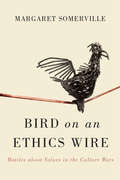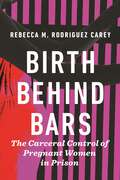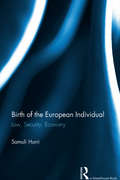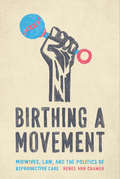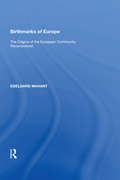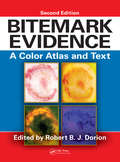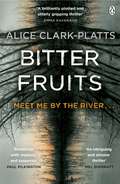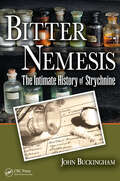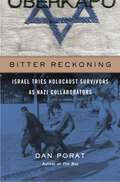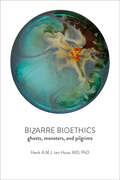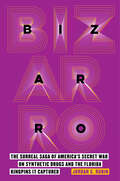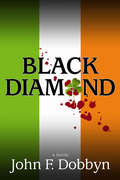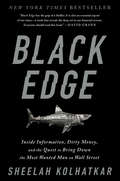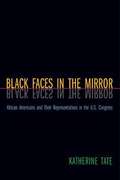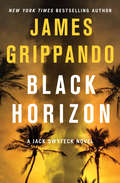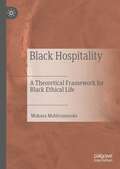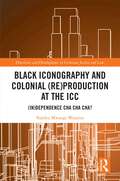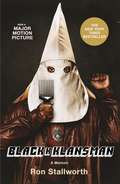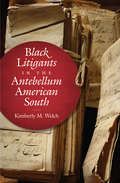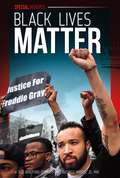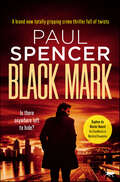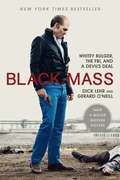- Table View
- List View
Bird Ambulance
by Arline ThomasStories from a woman in New York who began her own shelter for injured wild birds. She talks about assisting falcons, hawks, pigeons and owls, but there is also a chapter on other animals--like squirrels--who come into her life. A fantastic read with helpful information on what to feed injured birds and mammals.
Bird on an Ethics Wire: Battles about Values in the Culture Wars
by Margaret SomervilleOur physical ecosystem is not indestructible and we have obligations to hold it in trust for future generations. The same is true of our metaphysical ecosystem - the values, principles, attitudes, beliefs, and shared stories on which we have founded our society. In Bird on an Ethics Wire, Margaret Somerville explores the values needed to maintain a world that reasonable people would want to live in and pass on to their descendants. Somerville addresses the conflicts between people who espouse "progressive" values and those who uphold "traditional" ones by casting her attention on the debates surrounding "birth" (abortion and reproductive technologies) and "death" (euthanasia) and shows how words are often used as weapons. She proposes that we should seek to experience amazement, wonder, and awe to enrich our lives and help us to find meaning. Such experiences, Somerville believes, can change how we see the world and live our lives, and affect the decisions we make, especially regarding values and ethics. They can help us to cope with physical or existential suffering, and ultimately put us in touch with the sacred - in either its secular or religious form - which protects what we must not destroy. Experiencing amazement, wonder, and awe, Somerville concludes, can also generate hope, without which our spirit dies. Both individuals and societies need hope, a sense of connection to the future, if the world is to make the best decisions about values in the battles that constitute the current culture wars.
Bird on an Ethics Wire: Battles about Values in the Culture Wars
by Margaret SomervilleOur physical ecosystem is not indestructible and we have obligations to hold it in trust for future generations. The same is true of our metaphysical ecosystem - the values, principles, attitudes, beliefs, and shared stories on which we have founded our society. In Bird on an Ethics Wire, Margaret Somerville explores the values needed to maintain a world that reasonable people would want to live in and pass on to their descendants. Somerville addresses the conflicts between people who espouse "progressive" values and those who uphold "traditional" ones by casting her attention on the debates surrounding "birth" (abortion and reproductive technologies) and "death" (euthanasia) and shows how words are often used as weapons. She proposes that we should seek to experience amazement, wonder, and awe to enrich our lives and help us to find meaning. Such experiences, Somerville believes, can change how we see the world and live our lives, and affect the decisions we make, especially regarding values and ethics. They can help us to cope with physical or existential suffering, and ultimately put us in touch with the sacred - in either its secular or religious form - which protects what we must not destroy. Experiencing amazement, wonder, and awe, Somerville concludes, can also generate hope, without which our spirit dies. Both individuals and societies need hope, a sense of connection to the future, if the world is to make the best decisions about values in the battles that constitute the current culture wars.
Birth Behind Bars: The Carceral Control of Pregnant Women in Prison
by Rebecca M. CareyPregnant women's experiences in prisonFour percent of incarcerated women—more than three thousand—are pregnant in US prisons each year, yet little information is known about their pregnancy, birth, postpartum, and motherhood experiences. In Birth Behind Bars, Rebecca M. Rodriguez Carey draws on in-depth interviews with women who were once pregnant in prisons in the heart of the Midwest to provide a rare, intimate portrait into the intersection of motherhood and incarceration.Using a reproductive-justice framework and narrative accounts, Rodriguez Carey shows how the prison system works alongside other carceral systems, such as the medical system and the child welfare system, to regulate and control women. She reveals how their incarceration goes beyond the function of criminal punishment, threatening both maternal and fetal health and the well-being of families. Birth Behind Bars offers an evocative account of how these powerful carceral systems collectively disrupt entire families and communities during pregnancy, birth, and the postpartum period, including long after women are released from prison.
Birth of the European Individual: Law, Security, Economy
by Samuli HurriThis book examines the birth of the European individual as a juridical problem, focusing on legal case dossiers from the European Court of Justice as an electrifying laboratory for the study of law and society. Foucault’s story of the modern subject constitutes the book’s main theoretical inspiration, as it considers the encounter between legal and other practices within a more general field of juridical power: a network of active relations, between different social spheres. Through the analysis of delinquent individuals – each expelled from one of the Member States – the raw material for constructing the idea of the European individual is uncovered. The European individual, it is argued, emerged out of the intersection of regimes of law, security and economy, and its practices of knowledge-power. Birth of the European Individual: Law, Security, Economy will be of interest to those studying the individual in law, as well as anyone considering the relationships between power and the individual.
Birthing a Movement: Midwives, Law, and the Politics of Reproductive Care
by Renée Ann CramerRich, personal stories shed light on midwives at the frontier of women's reproductive rights. Midwives in the United States live and work in a complex regulatory environment that is a direct result of state and medical intervention into women's reproductive capacity. In Birthing a Movement, Renée Ann Cramer draws on over a decade of ethnographic and archival research to examine the interactions of law, politics, and activism surrounding midwifery care. Framed by gripping narratives from midwives across the country, she parses out the often-paradoxical priorities with which they must engage—seeking formal professionalization, advocating for reproductive justice, and resisting state-centered approaches. Currently, professional midwives are legal and regulated in their practice in 32 states and illegal in eight, where their practice could bring felony convictions and penalties that include imprisonment. In the remaining ten states, Certified Professional Midwives (CPMs) are unregulated, but nominally legal. By studying states where CPMs have differing legal statuses, Cramer makes the case that midwives and their clients engage in various forms of mobilization—at times simultaneous, and at times inconsistent—to facilitate access to care, autonomy in childbirth, and the articulation of women's authority in reproduction. This book brings together literatures not frequently in conversation with one another, on regulation, mobilization, health policy, and gender, offering a multifaceted view of the experiences and politics of American midwifery, and promising rich insights to a wide array of scholars, activists, healthcare professionals alike.
Birthmarks of Europe: The Origins of the European Community Reconsidered
by Edelgard MahantBy studying the negotiations which led to the conclusion of the original Treaty of Rome and the creation of the European Economic Community, this informative book, based on recently released archival sources, analyses the Franco-German bargain which shaped the Community's initial framework and policies. This is not just another book about Franco-German relations and the founding of the European Union. It presents a new theoretical framework which relates the founding of the European Community to its later development. An attempt to apply the ideational framework of the original Community to later developments, such as the single market and the Treaty on European Union, finds that the Union is still shaped by many of the ideas of the founding fathers. Birthmarks of Europe will be useful to teachers and students of the history and politics of the European Union, as well as to those studying the dynamics of the development of other regional integration networks.
Bitemark Evidence: A Color Atlas and Text, 2nd Edition (International Forensic Science and Investigation)
by Robert B. J. DorionExperts in the field of bitemark evidence confront complexities ranging from the identification and collection of evidence, to microscopic analysis, to legal implications and courtroom admissibility. Now in its second edition, Bitemark Evidence reflects the knowledge, training, experience, opinions, and research of 27 authors from around the world
Bitter Fruits: DI Erica Martin Book 1 (Erica Martin Thriller)
by Alice Clark-PlattsA stunning debut - part psychological thriller, part detective novel - from a powerful and distinctive new voice.The murder of a first-year university student shocks the city of Durham. The victim, Emily Brabents, was from the privileged and popular set at Joyce College, a cradle for the country's future elite.As Detective Inspector Erica Martin investigates the college, she finds a close-knit community fuelled by jealousy, obsession and secrets. But the very last thing she expects is an instant confession . . .The picture of Emily that begins to emerge is that of a girl wanted by everyone, but not truly known by anyone. Anyone, that is, except Daniel Shepherd. Her fellow student, ever-faithful friend and the only one who cares. The only one who would do anything for her . . .* * *Praise for Bitter Fruits:'There is a gripping, economic precision in this highly charged thriller.'Ralph Fiennes'Grabbed me from the first page and wouldn't let go. A compelling read, beautifully written ... A tense, captivating tale, brilliantly told'Rachel Abbott'Once I started reading it I couldn't stop. A brilliantly plotted and utterly gripping thriller.' Emma Kavanagh'Superbly gripping ... A very assured page-turning storm I read in one sitting.'Stav Sherez'A psychological police procedural ... An intelligent and thrilling debut.'Peter Guttridge, author and former Observer crime critic'Intriguing and sinister with masterful plotting and tension. A bittersweet read by a new crime author I can't wait to read again.' Mel Sherratt'A thought-provoking, atmospheric and emotional page turning thriller - brimming with mystery and suspense. I absolutely loved this novel, and devoured it from cover to cover.'Paul Pilkington
Bitter Nemesis: The Intimate History of Strychnine
by John BuckinghamEncouraged by the medicinal success of quinine, early 19th century scientists hoped strychnine, another plant alkaloid with remarkable properties, might also become a new weapon against disease. Physicians tried for over a century, despite growing evidence to the contrary, to treat everything from paralysis to constipation with it. But strychnine p
Bitter Reckoning: Israel Tries Holocaust Survivors as Nazi Collaborators
by Dan PoratDigging into newly declassified archives, Dan Porat unearths the story of Jews prosecuted by the State of Israel for Nazi collaboration. Over time courts and the public came to see Jewish ghetto administrators or kapos as tragic figures. Rigorous yet humane, Porat invites us to rethink ideas about victimhood, justice, and collective memory.
Bizarre Bioethics: Ghosts, Monsters, and Pilgrims
by Henk A.M.J. ten HaveThe focus of bioethical debates on exceptional cases neglects the underlying values—like justice and community—that would lend to a broader, more well-rounded understanding of today's world.Discussions of ethical problems in health care too often concentrate on exceptional cases. Bioethical controversies triggered by experimental drugs, gene-edited babies, or life extension are understandably fascinating: they showcase the power of medical science and technology while addressing anxieties concerning health, disease, suffering, and death. However, the focus on rare individual cases in the media spotlight turns attention away from more pressing ethical issues that impact global populations, such as access to health care, safe food and water, and the prevention of emerging infectious diseases. In Bizarre Bioethics, Henk A.M.J. ten Have argues that this focus on bizarre cases leads to bizarre bioethics with a narrow agenda for ethical debate. In other words, although these extreme cases are undeniably real, they present a limited and skewed view of everyday moral reality. This focus also assumes that individuals are rational decision-makers, so that the role of feelings and emotions can be downgraded. Larger questions related to justice, solidarity, community, meaning, and ambiguity are not appreciated. Such questions used to be posed by philosophical and theological traditions, but they have been exorcised and marginalized in the development of bioethics. Science, ten Have writes, is not a value-free endeavor that provides facts and evidence: it is driven by underlying value perspectives that are often based on metaphors and world views from philosophical and theological traditions. Drawing on a rich analysis of the literature, ten Have explains how bioethical discussion can be enriched by these metaphors and develops a broader approach that critically delves into the imaginative world views that determine understanding of the world and human existence. Examining the roles of the metaphors of ghosts, monsters, pilgrims, prophets, and relics, ten Have illustrates how science and medicine are animated by imaginations that fuel the search for hope, salvation, healing, and a predictable future. Bizarre Bioethics invites students, researchers, policymakers and teachers interested in ethics and health care to think about the value perspectives on health and disease today.
Bizarro: The Surreal Saga of America's Secret War on Synthetic Drugs and the Florida Kingpins It Captured
by Jordan S. RubinInside a drug war so screwy that people don’t know what’s illegal—until it’s too late. Bizarro is a page-turning tale of the unprecedented prosecution of Burton Ritchie and Ben Galecki, the Florida-based founders of a sprawling "spice" (synthetic cannabinoid) operation. With this book, journalist and former New York City narcotics prosecutor Jordan S. Rubin exposes a Reagan-era law called the Analogue Act, which targets dealers selling drugs that are "substantially similar" to controlled substances—an unwieldy law that produces erratic results in court. Rubin brings readers deep inside the synthetic war, exploring how Ritchie and Galecki landed in its crosshairs and why one of the DEA’s own chemists may have been their best chance at freedom, until he was arrested too. This stranger-than-fiction narrative is backed by thousands of pages of court records and exclusive interviews with defendants, lawyers, law enforcement, celebrities, and more. Bizarro reveals the world of underground chemists making drugs faster than the government can ban them, dealers making millions in a gray market, and a justice system run amok.
Black Diamond: A Novel (A Knight and Devlin Thriller #3)
by John F. DobbynIn the crosshairs of two warring mobsMichael Knight and Lex Devlin agree to defend a jockey accused of murdering a fellow jockey during a race at Boston's Suffolk Downs. Michael's expertise in the machinations of the horse racing game is expected to serve them well. But a personal attachment to the murdered jockey thrusts Michael and Lex into the midst of conflict between Boston's Irish mafia and remnants of the terrorist branch of the Irish Republican Army. Now they are in the crosshairs of both, and the brutality of these combatants knows no bounds. As Michael and Lex uncover layer after layer of deceptions involved in the seamier side of horse racing, they become more dangerous to the gangs. In action that shuttles between Ireland and Boston, the lives of the lawyers as well as those close to them are in the gravest danger and the criminals show no mercy in their quest to put an end to this threat. As their investigation hurtles forward, it could end a wonderful law partnership due to the absence of living partners.
Black Edge: Inside Information, Dirty Money, and the Quest to Bring Down the Most Wanted Man on Wall Street
by Sheelah KolhatkarThe story of the billionaire trader Steven A. Cohen, the rise and fall of his hedge fund, SAC Capital, and the largest insider trading investigation in history—for readers of The Big Short, Den of Thieves, and Dark Money. The rise over the last two decades of a powerful new class of billionaire financiers marks a singular shift in the American economic and political landscape. Their vast reserves of concentrated wealth have allowed a small group of big winners to write their own rules of capitalism and public policy. How did we get here? Through meticulous reporting and powerful storytelling, New Yorker staff writer Sheelah Kolhatkar shows how Steve Cohen became one of the richest and most influential figures in finance—and what happened when the Justice Department put him in its crosshairs. Cohen and his fellow pioneers of the hedge fund industry didn’t lay railroads, build factories, or invent new technologies. Rather, they made their billions through speculation, by placing bets in the market that turned out to be right more often than wrong—and for this they have gained not only extreme personal wealth but formidable influence throughout society. Hedge funds now manage nearly $3 trillion in assets, and competition between them is so fierce that traders will do whatever they can to get an edge. Cohen was one of the industry’s greatest success stories. He mastered poker in high school, went off to Wharton, and in 1992 launched SAC Capital, which he built into a $15 billion empire, almost entirely on the basis of his wizardlike stock trading. He cultivated an air of mystery, reclusiveness, and extreme excess, building a 35,000 square foot mansion in Greenwich, Connecticut, and amassing one of the largest private art collections in the world. On Wall Street, Cohen was revered as a genius. That image was shattered when SAC became the target of a sprawling, seven-year government investigation. Labeled by prosecutors as a “magnet for market cheaters” whose culture encouraged the relentless hunt for “edge”—and even “black edge,” or inside information—SAC was ultimately indicted in connection with a vast insider trading scheme, even as Cohen himself was never charged. Black Edge offers a revelatory look at the gray zone in which so much of Wall Street functions, and a window into the transformation of the U.S. economy. It’s a riveting, true-life legal thriller that takes readers inside the government’s pursuit of Cohen and his employees, and raises urgent questions about the power and wealth of those who sit at the pinnacle of modern Wall Street. Advance praise for Black Edge“Well-written, with pointed characterizations of the ambitious players and their motives, this book is highly recommended for readers interested in finance, crime, and politics.”—Library Journal (starred review) “A tour de force of groundbreaking reporting and brilliant storytelling, a revealing inside account of how the Feds track a high-profile target—and, just as important, an unsettling portrayal of how Wall Street works today.”—Jeffrey Toobin, New York Times bestselling author of American Heiress “Black Edge is not just a work of major importance, it is also addictively readable—and horrifyingly compelling.”—Jane Mayer, New York Times bestselling author of Dark Money “Fast-paced and filled with twists, Black Edge has the grip of a thriller.”—David Grann, New York Times bestselling author of The Lost City of Z
Black Faces in the Mirror: African Americans and Their Representatives in the U. S. Congress
by Katherine TateHere, Katherine Tate examines the significance of race in the U. S. system of representative democracy for African Americans. Presenting important new findings, she offers the first empirical study to take up the question of representation from both sides of the constituent-representative relationship. The first half of the book examines whether black members of the U. S. House legislate and represent their constituents differently than white members do. Representation is broadly conceptualized to include not only legislators' roll call voting behavior and bill sponsorship, but also the symbolic acts in which they engage. The second half looks at the issue of representation from the perspective of ordinary African Americans based on a landmark national survey. Tate's findings are mixed. But, in the main, legislators' race does shape how they represent their constituents and how constituents evaluate them. African Americans view black representatives more positively than they do white representatives, even those who belong to their own political party. Black legislators, however, are just as likely as white representatives to sponsor and gain passage of bills in the House. Tate also concludes that black House members are more liberal as a group than are their black constituents, but that there is considerable divergence in the quality and type of representation they provide. The findings reported here will generate controversy in the fields of politics, law, and race, particularly as debate commences over renewing the Voting Rights Act, which is set to expire in 2007.
Black Horizon (Jack Swyteck #11)
by James Grippando<P>Miami attorney Jack Swyteck finds himself in the middle of an international legal battle over a Cuban oil spill that sets him on a deadly mission. <P>Three summers after the Deepwater Horizon environmental catastrophe, oil is spewing into the ocean again, this time from a drilling explosion in Cuban waters just fifty miles from the Florida Keys. The slick is headed straight for the United States, but the Cubans refuse American offers to assist with the cleanup, and threaten to fire on "hostile" U.S. vessels entering their waters. Backstopping the Cubans is the powerful consortium that owned and operated the rig, and is tied to the Chinese, Russian, and Venezuelan governments, who stonewall all inquiries and relief efforts. <P>Jack and his new wife, Andie Henning, an undercover agent for the FBI, are honeymooning in the Keys when Andie is called away on an assignment shrouded in secrecy. Jack, too, is soon back at work, representing an American woman whose Cuban husband was killed in the rig explosion. Though the spill occurred in foreign waters, Jack draws on all his legal know-how to file a wrongful death suit in a U.S. court and hopefully bring the young widow a semblance of closure. <P>Jack's pursuit of the unimaginably complicated international case plunges him into a dangerous world filled with treacherous twists that lead him--and Andie--to the same shocking realization . . . that the looming environmental disaster may have been no "accident" at all.
Black Hospitality: A Theoretical Framework for Black Ethical Life
by Mukasa MubirumusokeThis book addresses the paucity of robust reflections on ethics as a distinct field of experience in recent Black Studies scholarship. Following the intervention of the Afro-Pessimist school of thought—spearheaded by the likes of Frank Wilderson III and Jared Sexton—there has been much needed attention brought to the totalizing nature of Black political degradation and vulnerability in America. However, an in depth reflection on the ethical implications of this political positionality is lacking and in places even implied to not be possible. Black Hospitality conceptualizes what the author argues is the aporetic experience of Black ethical life as both excessively vulnerable within and yet also ultimately hostile to an anti-black political ontology. Engaging the work of scholars such as Fred Moten, Saidiya Hartman, Nahum Chandler, Jacques Derrida, Theodor Adorno, and Toni Morrison, along with the concepts of fugitivity, Black sociality, im-possibility, and paraontology, Black Hospitality insists that Black ethical life provides a necessary broadening of the contours of Black experience.
Black Iconography and Colonial (re)production at the ICC: (In)dependence Cha Cha Cha?
by Stanley Mwangi WanjiruThis book explores the reproduction of colonialism at the International Criminal Court (ICC), and examines International criminal law (ICL) vs the Black body through an immersive format of Art, Music, Poetry, and Architecture and post-colonial/critical race theory lens. Taking a multi-disciplinary approach, the book interrogates the operationalization of the Rome statute to detail a Eurocentric hegemony at the core of ICL. It explores how colonialism and slavery have come to shape ICL, exposing the perpetuation of the colonial and warns that it heralds ominous contemporary and future implications for Africa. As currently envisaged and acted out at the ICC, this law is founded on deceptive and colonial ideas of ‘what is wrong’ in/with the world. The book finds that the contemporary ICL regime is founded on white supremacy that corrupts the law’s interaction with the African. The African is but a unit utilised by the global elite to exploit and extract. From time to time, these alliances disintegrate with ICL becoming a retaliatory tool of choice. What is at stake, is power, not justice. This power is hierarchical with Eurocentrism at the top throughout modern history. Colonialism is seen not to have ended but to have regerminated through the foundation of the ‘independent’ African state. The ICC reproduces the colonial by use of European law, and ultimately the over representation of the black accused. To conclude, the book provides a liberated African forum that can address conflicts in the content, with a call for the end of the ICC’s involvement in Africa. The demand is made for an African Court that utilises non-colonising African norms which are uniquely suited to address local conflicts. Multidisciplinary in nature, this book will be of great interest to students and scholars of International Criminal Law, Criminal Justice, Human Rights Law, African Studies, Global Social Justice, Sociology, Anthropology, Postcolonial Studies, and Philosophy.
Black Klansman: Race, Hate, and the Undercover Investigation of a Lifetime
by Ron StallworthThe extraordinary true story and basis for the major motion picture BlacKkKlansman, written and directed by Spike Lee, produced by Jordan Peele, and starring John David Washington and Adam Driver. <P><P>When detective Ron Stallworth, the first black detective in the history of the Colorado Springs Police Department, comes across a classified ad in the local paper asking for all those interested in joining the Ku Klux Klan to contact a P.O. box, Detective Stallworth does his job and responds with interest, using his real name while posing as a white man. <P><P>He figures he’ll receive a few brochures in the mail, maybe even a magazine, and learn more about a growing terrorist threat in his community. A few weeks later the office phone rings, and the caller asks Ron a question he thought he’d never have to answer, “Would you like to join our cause?” <P><P>This is 1978, and the KKK is on the rise in the United States. Its Grand Wizard, David Duke, has made a name for himself, appearing on talk shows, and major magazine interviews preaching a “kinder” Klan that wants nothing more than to preserve a heritage, and to restore a nation to its former glory. <P><P>Ron answers the caller’s question that night with a yes, launching what is surely one of the most audacious, and incredible undercover investigations in history. Ron recruits his partner Chuck to play the "white" Ron Stallworth, while Stallworth himself conducts all subsequent phone conversations. <P><P>During the months-long investigation, Stallworth sabotages cross burnings, exposes white supremacists in the military, and even befriends David Duke himself. Black Klansman is an amazing true story that reads like a crime thriller, and a searing portrait of a divided America and the extraordinary heroes who dare to fight back. <P><b>A New York Times Bestseller</b>
Black Litigants in the Antebellum American South (The John Hope Franklin Series in African American History and Culture)
by Kimberly M. WelchIn the antebellum Natchez district, in the heart of slave country, black people sued white people in all-white courtrooms. They sued to enforce the terms of their contracts, recover unpaid debts, recuperate back wages, and claim damages for assault. They sued in conflicts over property and personal status. And they often won. Based on new research conducted in courthouse basements and storage sheds in rural Mississippi and Louisiana, Kimberly Welch draws on over 1,000 examples of free and enslaved black litigants who used the courts to protect their interests and reconfigure their place in a tense society.To understand their success, Welch argues that we must understand the language that they used--the language of property, in particular--to make their claims recognizable and persuasive to others and to link their status as owner to the ideal of a free, autonomous citizen. In telling their stories, Welch reveals a previously unknown world of black legal activity, one that is consequential for understanding the long history of race, rights, and civic inclusion in America.
Black Lives Matter
by Duchess Harris Sue Bradford EdwardsBlack Lives Matter covers the shootings that touched off passionate protests, the work of activists to bring about a more just legal system, and the tensions in US society that these events have brought to light. Aligned to Common Core Standards and correlated to state standards. Essential Library is an imprint of Abdo Publishing, a division of ABDO.
Black Mark
by Paul SpencerHe couldn&’t save his reputation, his marriage, or his career—but he&’s dead-set on saving a friend framed for murder . . . Divorced, disbarred, and broke. That&’s where former defense attorney Mick Ward found himself after a drug-fueled collapse, and now all he wants is a quiet life. But when he discovers a body on his friend Elliott&’s property, Mick has to get involved. Because the body belongs to a rival from Elliott&’s criminal past, and someone&’s planted a gun in his house. Currently a Black Lives Matter activist running for Portland&’s city council, Elliott suspects he&’s been targeted by vengeful cops. But the worst is yet to come, and with Mick unable to practice law, he&’ll have to work around the system any way he can to help his friend . . .
Black Mass: Whitey Bulger, the FBI, and a Devil's Deal
by Dick Lehr Gerard O'NeillJohn Connolly and James “Whitey” Bulger grew up together on the tough streets of South Boston. Decades later in the mid-1970s, they met again. By then, Connolly was a major figure in the FBI’s Boston office and Whitey had become godfather of the Irish Mob. Connolly had an idea, a scheme that might bring Bugler into the FBI fold and John Connolly into the Bureau’s big leagues. But Bulger had other plans. Soon to be a major motion picture starring Johnny Depp as Whitey Bulger, Black Mass is the chilling true story of what happened between them—a dark deal that spiraled out of control, leading to drug dealing, racketeering, and murder.
Black Mass: Whitey Bulger, the FBI, and a Devil's Deal
by Dick Lehr Gerard O'NeillJohn Connolly and James "Whitey" Bulger grew up together on the tough streets of South Boston. Decades later in the mid-1970s, they met again. By then, Connolly was a major figure in the FBI's Boston office and Whitey had become godfather of the Irish Mob. Connolly had an idea, a scheme that might bring Bugler into the FBI fold and John Connolly into the Bureau's big leagues. But Bulger had other plans. Soon to be a major motion picture starring Johnny Depp as Whitey Bulger, Black Mass is the chilling true story of what happened between them--a dark deal that spiraled out of control, leading to drug dealing, racketeering, and murder.

